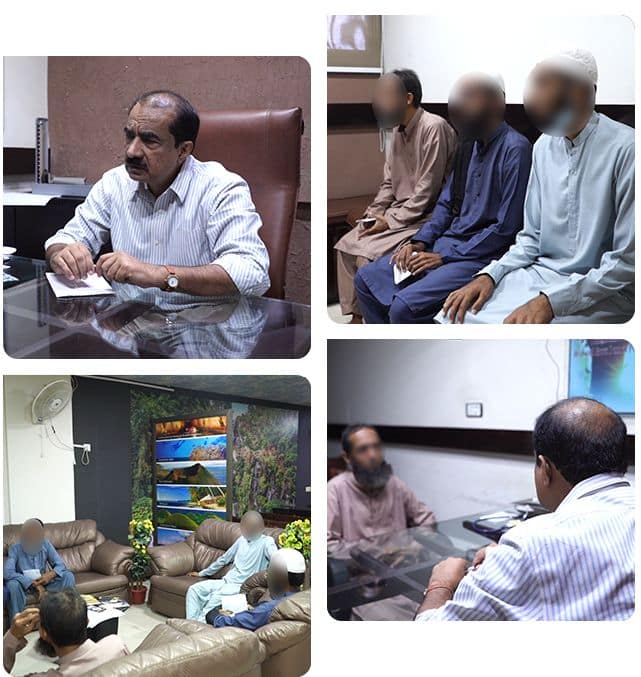
Psychiatric OPD Through Best Psychiatrist in Karachi
Connect With Us For The Consultancy
What is Psychiatry?
Psychiatry is a branch of medicine that focuses on the assessment, diagnosis, treatment, and prevention of mental, behavioral as well as emotional disorders. A psychiatrist is a medical doctor (MD or DO) who has a specialization in mental health. They are qualified to evaluate the physical and mental both aspects of psychological issues. They offer treatments to patients who suffer from intellectual, emotional, mental, and social disorders, addictions, or eating disorders by performing psychological procedures and prescribing medicines. There are many reasons due to why people seek psychiatric help. The concern can even be a sudden one like hearing voices, suicidal thoughts, frightening hallucinations, or panic attacks or a long-term one like the feeling of hopelessness, sadness, and anxiety that never seems to go away and causes everyday life to feel out of control.
Mental illness is associated with emotional, mental, or behavioral disorders that can later develop as chronic depression, bipolar disorder, schizophrenia, etc, and can affect irrespective of gender, age, religion, background, or social status. Nevertheless, with proper care, it can be treated over time. Psychiatrists come across a diverse range of patients in a clinical setting. They help patients make management plans to carry on their activities of daily life despite their medical concerns and help them towards a path of recovery.
Transformation wellness clinic's psychiatry OPD by Dr. Imran Sadiq provides a comprehensive, robust behavioral health outpatient service to meet the complex social, medical, and psychiatric needs of our patient population.

Inspire for Better Living…
Let’s Connect!

What does a psychiatrist do in an OPD setting?
A psychiatrist evaluates your physical and mental symptoms, makes a diagnosis, and makes up a customized treatment plan accordingly. They prescribe medications, psychological treatment, and procedures like electroconvulsive therapy or rTMS. All in all, they can:
- Give advice related to lifestyle modification.
- Help patients recover from mental health conditions that are long-term.
- Help patients immediately with sudden mental illness.
- Refer patients to the hospital if required to admit.
- Work with patients individually or along with their family or partner.
What conditions do psychiatrists treat in OPD?
Psychiatrists treat many conditions once they have diagnosed them. Some of them are:
- Anxiety disorder
- Alcohol or other substance abuse
- ADHD
- Alzheimer’s disease
- Bipolar disorder
- Autism spectrum disorder
- Eating disorder
- Depression
- Gender dysphoria
- Body dysmorphic disorder
- Dissociative disorder
- Obsessive-compulsive disorder (OCD)
- Personality disorder
- Mood disorder
- Panic disorder
- Hoarding disorder
- Post-traumatic stress disorder (PTSD)
- Schizophrenia
- Schizoaffective disorder
- Sleep disorder
- Post-partum depression

How do they diagnose patients?
Psychiatrists are physicians and can order a full range of medical lab tests along with psychological ones. The reports when combined with the discussion of their patients give them a full picture of a mental and physical state. Their clinical training and education help them to understand the relationship between a client's medical and emotional illness. With this, they can evaluate psychological and medical data for a proper diagnosis and develop a treatment plan ahead. It is significant to note that the diagnosis is based on the established criteria of APA's Diagnostic and Statistical Manual of Mental Disorders (DSM-5). It consists of detailed criteria and symptoms for diagnosing mental disorders/issues.
Which treatments are used by Psychiatrists?
There are a variety of treatments that are used by a psychiatrist. These include psychosocial interventions, medications, psychotherapy, and other methods like ECT or electroconvulsive therapy depending on the patient's requirements.
- Talk therapy treatment also known as psychotherapy relates to a talking relationship between the patient and the doctor. It is used to treat a variety of emotional concerns as well as mental disorders. The goal is to make the patient function better and achieve a healthier lifestyle in general by controlling troubling symptoms. The treatment may take many sessions over a period of time or even a few sessions in a week time depending on the extent of the patient's mental health.
- Different forms of psychotherapies may also be used that are tailored to help solve problems in specific areas. While some help patients explore the effect of their past experiences on current behaviors, others change thought patterns or behaviors, some are goal-oriented and are focused on problem-solving like cognitive behavior therapy. An individual form of psychotherapy also known as psychoanalysis may take sessions over years as it is an intensive one.
- Just like a doctor would prescribe medications for diabetes or hypertension, the same way psychiatrists prescribe medicines to treat mental disorders as they help in modulating communication and better chemical signaling in the brain. This ultimately alleviates the symptoms of an individual suffering from a psychiatric disorder. Psychiatrists tend to meet their patients periodically who are taking long-term medications for monitoring their effectiveness and if there are any side effects. The class of medications used is as follows:
- Sedatives and anxiolytics- are used for the treatment of insomnia and anxiety.
- Mood stabilizers- used for the treatment of bipolar disorders.
- Antidepressants –are commonly used for PTSD, depression, anxiety, OCD, eating disorder, panic disorder, and borderline personality disorder.
- Hypnotics –used to maintain or induce sleep.
- Antipsychotic medications –are used for bipolar disorder, schizophrenia, and psychotic symptoms like hallucinations and delusions.
- Stimulants –used for the treatment of
- Sometimes, psychotherapy along with medicines is prescribed by psychiatrists. There are many more treatments like vagus nerve stimulation (VNS), Deep brain stimulation (DBS), and transcranial magnetic stimulation (TMS) are often used to treat mental disorders while Electroconvulsive therapy (ECT) applies electric currents to the brain to treat severe depression which has failed to respond to other treatments. Similarly, light therapy is also used but for seasonal depression only.
Psychiatric OPD in Karachi
How will be my visit to a psychiatrist?
A patient is required to complete a series of questionnaires on his/her first OPD appointment. It is possible that you may be asked to sign a consent form for the release of information in case your psychiatrist wants to communicate with another clinician to optimize the treatment plan.
You will be scheduled for follow-ups regularly especially if medication is prescribed by the psychiatrist. Since a lot of individuals tend to benefit from a combination of medication and counseling, your psychiatrist is likely to recommend it during your follow-up visit as a form of treatment.

Psychiatric OPD services in Karachi
There are various kinds of programs offered in a clinical setup. Some of them are:
1. Technique-based programss
- Cognitive behavioral therapy (CBT): it is a specialized treatment for psychiatric and medical disorders.
- Behavioral Medicine Program: specialized care of health for patients who are impacted by both medical and psychiatric
- Dialectical Behavior Therapy: various techniques are used like instructions given to regulate emotions that are based on acceptance and affect cognitive behavior.
- Couples and Family Psychotherapy: consultation, therapy services, or referral is given to family or couple in an OPD.
- Psychodynamic Psychotherapy: the patient is encouraged to talk and engage with the doctor so they may look into the less conscious meanings of his/her assumptions in order to try other alternatives.
2. Population-based Programs
- Geriatric Psychiatry: this is a special form of care for old patients. It includes their diagnosis as well as treatment of anxiety and mood disorders, substance use disorder, memory disorder, and personality disorder. Psychiatrists have a variety of treatments to choose from including group psychotherapy, psychopharmacology, psychosocial assessment and management, individual psychotherapy, or family intervention.
3. Women's Mental Health Programss
- Postpartum psychiatric disorder: it is specifically designed for postpartum women. Evaluation and treatment of patients suffering from postpartum psychiatric disorders including anxiety disorders and postpartum depression. Non-pharmacologic and pharmacologic treatments are offered.
- Pregnancy-related psychiatric disorders: this service offers a comprehensive evaluation for pregnant women dealing with psychiatric disorders or those who want to conceive.
- Premenstrual syndrome (PMS) and premenstrual dysphoric disorder (PMDD): our clinical OPD setting offers treatments for those going through premenstrual depression.
- Menopause-related Psychiatric symptoms: this service is for women experiencing depressive symptoms owing to menopause.
4. Medical Psychiatry Specialty Programs
These specialized services are for medical patients who are suffering from neuropsychiatric complications. They include:
- Sexual dysfunction.
- Burns and trauma.
- HIV and AIDS.
- Heart, lung, liver, and renal transplants.
- Gastrointestinal, head, breast, brain, neck, genitourinary, and bone marrow
- Neuropsychiatric issues
- Pain
Remember, there is no shame in seeking help for a condition related to mental health. The sooner you visit a psychiatrist, the closer you are to getting better.
For more information, please visit our website : https://transformation.com.pk/
This requires a self-assessment of your day-to-day experiences of symptoms. Even though you are not required to self-diagnose yourself of any mental health issue, you can always note down your thoughts, emotions, and behavior pattern from time to time that is disruptive and not healthy in your daily lifestyle. It is vital to seek immediate help for mental health problems even if it's overwhelming at first. It becomes better with time and one must remember that the brain and body are wired together and may affect one’s physical life significantly if he/she is not treated mentally.
Once you have noted down the pattern, you can go directly to your psychiatrist and share the symptoms to receive a proper diagnosis and treatment. Mental health episodes can be constant, infrequent, or even random. It is a clear sign you need medical attention if these episodes are affecting your quality of life.
If you are facing any of the following experiences or symptoms, you should consider visiting a psychiatrist:
- Eating disorders.
- Thoughts of self-harm.
- Substance use.
- Withdrawal from social
- Poor performance at work.
- Changes in sleep patterns.
- Extreme sadness or worrying.
- Finding it hard to control your emotions.
- Frequent and continuous episodes of rage or fear.
- Irrational or extreme fear.
For more information, please visit our website : https://transformation.com.pk/
During your appointment, you can ask your psychiatrist various questions to understand yourself better like:
- What is your experience in the field of psychiatry?
- Can you share your diagnosis?
- When can I expect to feel better?
- If I feel worse at home, what should I do?
- If there is an emergency, who should I contact and what should I do?
- What are the treatment options for me?
- Are there any side effects of the medication given to me?
- How many times a day should I take the medication and when?
- When will I have my next follow-up?
For more information, please visit our website : https://transformation.com.pk/
During your appointment, you can ask your psychiatrist various questions to understand yourself better like:
- What is your experience in the field of psychiatry?
- Can you share your diagnosis?
- When can I expect to feel better?
- If I feel worse at home, what should I do?
- If there is an emergency, who should I contact and what should I do?
- What are the treatment options for me?
- Are there any side effects of the medication given to me?
- How many times a day should I take the medication and when?
- When will I have my next follow-up?
For more information, please visit our website : https://transformation.com.pk/
On the other hand, a psychiatrist is a medical professional who has completed 5 years of medical school along with a residency. Not just this, he/she receives a specialization in psychiatry. A psychiatrist is able to prescribe medical treatments with medications and can also conduct psychotherapy.
For more information, please visit our website : https://transformation.com.pk/
One must complete his/her medical school to become a psychiatrist. Not only this, there are license examinations to be given to practice medicine along with four years of psychiatry residency. The first year of residency is about working in a hospital with a wide range of medical conditions to understand and expose themselves to the surrounding. A psychiatrist then spends three more years in learning and treating mental health illnesses along with the use of psychiatric medications. The training takes place in out-patient, in-patient, and even emergency settings. Your psychiatrist may even have additional specialized training after general psychiatry and become certified in:
- Sleep medicine
- Addiction psychiatry
- Child and adolescent psychiatry
- Forensic (legal) psychiatry
- Pain medicine
- Geriatric psychiatry
- Psychosomatic medicine ( mind and body)
For more information, please visit our website : https://transformation.com.pk/
An initial visit to a psychiatrist may take up to 30 mins to an hour. It is better to be prepared before the appointment to get the most results out of it.
Some of the ways are:
- Make a list beforehand of all the things you want to discuss with the doctor and bring it on the day of the appointment.
- Discuss the changes in existing symptoms or if you have experienced any new ones. It is easy to track the symptoms that affect your quality of life by maintaining a personal journal.
- Let the doctor know if you have noticed any physical health changes.
- Discuss the mental and physical health condition of your family.
- Make sure you bring a list of all the current medications or substances you might be taking. It is extremely important to always stay loyal to your doctor. These include supplements, vitamins, herbal medicines, over-the-counter medications, or any recreational drug.
- You can share how your co-workers, family, and friends who genuinely care about you see you doing in life.
For more information, please visit our website : https://transformation.com.pk/
Transformation wellness clinic serves patients with varying degrees of mental illnesses with a qualified psychiatrist in hand. Our psychiatry OPD provides a comprehensive approach to mental health disorders like anxiety, posttraumatic stress, disruptive behaviors, ADHD, Oppositional Defiant Disorder, depression, mood disorders, psychosis, substance use disorders, and medical coping.
Dr. Imran Sadiq (MBBS, DPM, DPP (England), FCPS) is a well-known licensed psychiatrist at TWC. Over years of experience, he specializes in providing customized care and effective behavioral management techniques for patients dealing with psychiatric issues. The appointments are scheduled from Mon-Sat. The fee for OPD appointments is 1200rs per session with free OPDS on Tuesdays. The medications given are in-house for your comfort and treatments are always tailored to an individual’s needs to help you achieve your goals. Our expertise is all about helping you lead a healthy, balanced and enhanced life.
Start your journey today!
Do not hesitate to reach out if you or your loved ones are struggling. Our professional medical specialist in psychiatry Dr. Imran Sadiq is standing by to help you take the first step towards a fulfilling life. We are all about transforming the lives of individuals.
Make sure you contact TWC at +92 21 34990110, +92 322 3746726, or write us at tis@transformation.com.pk, or clinics@transformation.com.pk for any queries.
For more information, please visit our website : https://transformation.com.pk/
